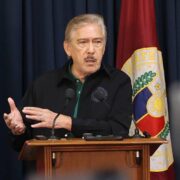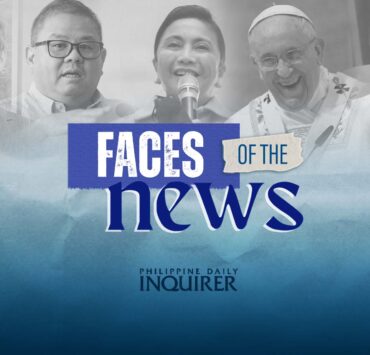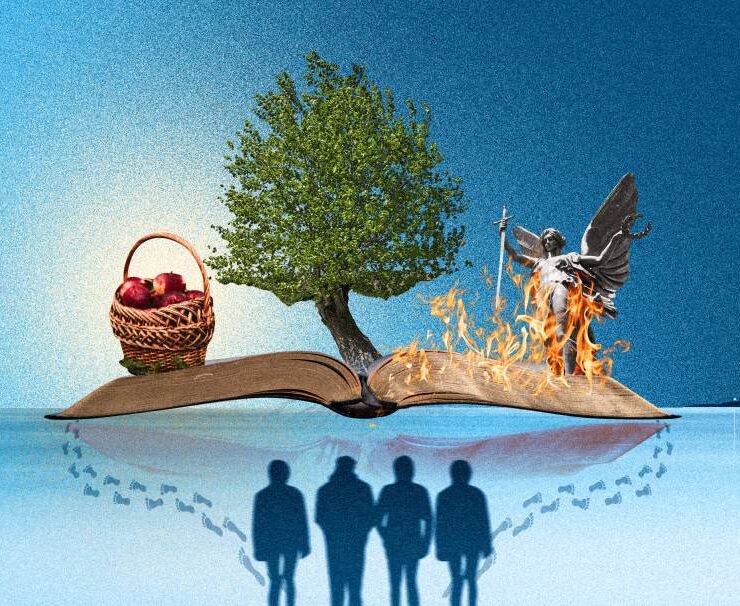The ‘medicine of mercy’

April 27, 2025 – Second Sunday of Easter – Sunday of Divine Mercy
Readings: Acts 5:12-16; Psalm 118, R. Give thanks to the Lord for he is good, his love is everlasting.; Revelation 1:9-11a, 12-13, 17-19; Gospel – John 20:19-31
As we celebrate Divine Mercy Sunday, I invite you to reflect on it in three “stages.” First is to set the context by remembering three popes. Second is to see the three faces of mercy in today’s Gospel. Third is a final reflection on Pope Francis’ legacy.
They are three Popes we can consider as significant voices proclaiming God’s mercy in modern times.
St. Pope John Paul II designated the Second Sunday of Easter and the final day of the Octave of Easter as Divine Mercy Sunday. Together with this was his being instrumental in popularizing the devotion to the Divine Mercy.
St. Pope John the XXIII, who surprised not just the church, but the whole world by calling for an ecumenical council, the Second Vatican Council or Vatican II, has an often-quoted line that stated that the church must dispense the “medicine of mercy” to a troubled world.
Five decades later, Pope Francis made it clear from the start of his papacy that he intended to continue the work started in Vatican II by “the good pope,” the name lovingly given to St. Pope John XXIII.
We can see the parallel in Pope Francis describing the church as a field hospital attending to the needs of the people, healing the broken with the “medicine of mercy.”
We remember these three Popes who focused the church’s attention on the centrality of proclaiming God’s mercy in her mission.
God’s mercy was the heart of it from the beginning: “For God so loved the world that he gave his only Son, so that everyone who believes in him might not perish but might have eternal life.” (John 3: 16) From the moment of his Incarnation it was a mission of love and mercy.
Three faces
Today’s Gospel gives us three faces of mercy: peace, forgiveness, and understanding.
“Peace be with you” was a common greeting of the Risen Lord in many Resurrection narratives, including this Sunday’s.
Peace and joy were promised by the Lord, a peace and joy that only he can give. With his Resurrection we come to understand this better. It is the peace of the Risen Lord, the joy of the Resurrection.
Peace and joy are fruits of God’s mercy. The Lord blesses us with them, and we must remember and celebrate that he won these for us through his Cross and Resurrection.
The second face of God’s mercy is his forgiveness, which he commissioned his disciples and his church to spread.
“‘As the Father has sent me, so I send you.’ And when he had said this, he breathed on them and said to them, ‘Receive the Holy Spirit. Whose sins you forgive are forgiven them, and whose sins you retain are retained.’”
Forgiveness was, is and will always be central to the mission of Jesus and of the church. St. Paul tells us, “But God proves his love for us in that while we were still sinners Christ died for us.” (Romans 5: 8)
We profess this every time we pray the Apostles’ Creed, “I believe in the Holy Spirit, the holy Catholic Church, the communion of saints, the forgiveness of sins, the resurrection of the body and life everlasting.”
Forgiveness is one of the most concrete expressions of God’s mercy, an expression we are asked to emulate—“forgive us our trespasses as we forgive those who trespass against.”
The third face of God’s mercy is his understanding. He addresses Thomas’ doubt by obliging him, inviting him, “Put your finger here and see my hands, and bring your hand and put it into my side, and do not be unbelieving, but believe.”
The mercy of understanding enters our context and guides us through our challenges and struggles to see the meaning in all of these, our context and experiences.
The poor
A final reflection is on Pope Francis’ legacy. In the conclave that elected Pope Benedict XVI, then Cardinal Bergolio, when he realized he was a serious contender to the papacy, had to think of a name he would choose if elected. He thought of John XXIV not just to honor “the good pope” in name, but to continue his work in Vatican II.
When he was elected pope in the conclave after Pope Benedict XVI’s resignation, he still had in mind John XXIV as his name if elected. This changed when, after he was elected pope, his good friend, Cardinal Hummes, embraced him and whispered, “Do not forget the poor, Jorge.”
Right there and then the name Francis came to mind, inspired by St. Francis of Assisi, the saint of poverty and of the poor.
It is said that Pope Francis often made the comment that he knows the name of the next pope. It will not be John Paul III, not Benedict XVII, nor Francis II, but it will be John XXIV.
These stories reveal to us a simple yet profound legacy of Pope Francis. He believed so much in St. Pope John XXIII’s vision of the church as one that is truly universal, beyond Rome and going into the whole world dispensing “the medicine of mercy.”
Pope Francis wanted a church that is poor to truly be a church of the poor. A church that echoes what the Lord proclaimed at the beginning of his ministry, “The Spirit of the Lord is upon me, because he has anointed me to bring glad tidings to the poor… and to proclaim a year acceptable to the Lord.” (Luke 4: 18-19)
Thank you, Pope Francis, for making “our hearts burn within us” again to help build a church with, of and for the poor. Rest in the peace, joy and mercy of our Risen Lord.





















